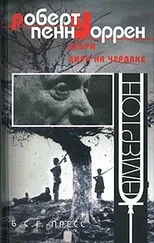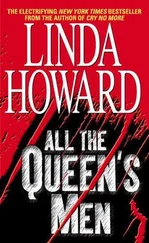Роберт Уоррен - All the king's men
Здесь есть возможность читать онлайн «Роберт Уоррен - All the king's men» весь текст электронной книги совершенно бесплатно (целиком полную версию без сокращений). В некоторых случаях можно слушать аудио, скачать через торрент в формате fb2 и присутствует краткое содержание. Жанр: Современная проза, на английском языке. Описание произведения, (предисловие) а так же отзывы посетителей доступны на портале библиотеки ЛибКат.
- Название:All the king's men
- Автор:
- Жанр:
- Год:неизвестен
- ISBN:нет данных
- Рейтинг книги:4 / 5. Голосов: 1
-
Избранное:Добавить в избранное
- Отзывы:
-
Ваша оценка:
- 80
- 1
- 2
- 3
- 4
- 5
All the king's men: краткое содержание, описание и аннотация
Предлагаем к чтению аннотацию, описание, краткое содержание или предисловие (зависит от того, что написал сам автор книги «All the king's men»). Если вы не нашли необходимую информацию о книге — напишите в комментариях, мы постараемся отыскать её.
All the king's men — читать онлайн бесплатно полную книгу (весь текст) целиком
Ниже представлен текст книги, разбитый по страницам. Система сохранения места последней прочитанной страницы, позволяет с удобством читать онлайн бесплатно книгу «All the king's men», без необходимости каждый раз заново искать на чём Вы остановились. Поставьте закладку, и сможете в любой момент перейти на страницу, на которой закончили чтение.
Интервал:
Закладка:
So I sat in one of his broken-down easy chairs, after he had cleared the books out, and drank his whisky, and waited for the moment when I was going to say, "Now, listen here, I'm going to tell you something and don't you start yelling till I finish."
He didn't yell till I had finished. Not that I took long to finish. I said, "Governor Stark wants you to be director of the new hospital and medical center."
He didn't, to be precise, yell then. He didn't make a sound. He looked at me for nearly a minute, with an unsmiling clinical eye as though my symptoms merit special attention; then he slowly shook his head. "Better think it over," I said, "maybe it's not as bad as it sounds, there may be some angles–" But I let my voice trail off, watching him shake his head again and smile now with the smile which did not forgive me but humbly asked me to forgive him for not being like me, for not being like everybody else, for not being like the world.
If he had not smiled. If he had smiled but had smiled a confident, to-hell-with-you, satirical smile. Or even a smile forgiving me. If he had not smiled the smile which humbly, but with dignity, begged me to forgive him, then things might have been different. But he smiled that way out of the fullness of whatever it was he had, out of the depth of the idea he lived by–whatever the hell it was or whyever the hell he lived that way–and things were the way they turned out to be. Giving that smile, he was like a man who stops to give a beggar a buck and in opening his wallet lets the beggar catch sight of the big roll. If the beggar hadn't seen the big roll he would never have followed the man down the street, waiting for the block without the street lamp. Not so much because he wants the roll as because he now cannot endure the man who has it and gave him a buck.
For as he smiled and said, "But I'm not interested in the angles," I did not feel that shy warmth as of the winter sunshine which I had always felt before when he smiled, but suddenly felt something else, which I didn't have a name for but which was like the winter itself and not the winter sunshine, like the stab of an icicle through the heart. And I thought: _All right, you smile like that–you smile like that–__
So, even as the thought vanished–if a thought can ever be said to vanish, for it rises out of you and sinks back into you–so I said, "But you don't know what the angles are. For instance, the Boss expects you to write your ticket."
"The Boss," he repeated, and on the words his upper lip curled more than customary to expose the teeth, and the sibilance seemed exaggerated, "need to expect to buy me. I have–" he looked about the room at the clutter and near-squalor–"everything I want."
"The Boss isn't any fool. You don't think he was trying to buy you?"
"He couldn't," he said.
"What do you think he was trying to do?"
"Threaten me. That would be next."
"No," I nodded, "no that. He couldn't scare you."
"That is what he seems to depend on. The bribe or the threat."
"Guess again," I said.
He rose from his chair, took a couple of restless paces across the frayed green carpet, then swung to face me. "He needn't think he can flatter me," he said, fiercely.
"Nobody can flatter you," I said, softly, "nobody in the world. And do you know why?"
"Why?"
"Listen, pal, there was a man name Dante, who said that the truly proud man knew his own worth could never commit the sin of envy, for he could believe that there was no one for him to envy. He might just as well have said that the proud man who knew his own worth would not be susceptible to flattery, for he would believe that there was nothing anybody else could tell him about his own worth he didn't know already. No, you couldn't be flattered."
"Not by him, anyway," Adam said grimly.
"Not by anybody," I said. "And he knows it."
"What does he try for, then? Does he think I–"
"Guess again," I said.
He stood there in the middle of the frayed green carpet and stared at me, head slightly lowered, with the slightest shade–not of doubt or perturbation–over the fine abstract blue of the eyes. It was just the shade of question, of puzzlement.
But that is something. Not much, but something. It is not the left to the jaw and it does not rock them on their heels. It does no make the breath come sharp. It is just the tap on the nose, the scrape across with the rough heel of the glove. Nothing lethal, just a moment's pause. But it is an advantage. Push it.
So I repeated, "Guess again."
He did not answer, looking at me, with the shade deeper like a cloud passing suddenly over blue water.
"All right," I said, "I'll tell you. He knows you are the best around, but you don't cash in on it. So obviously, you don't want money, or you would charge folks something like the others in the trade or would hang on to what you do take. You don't want fun, or you would get some, for you are famous, relatively young, and not crippled. You don't want comfort, or you would quit working yourself like a navvy and wouldn't live in this slum. But he knows what you want."
"I don't want anything he can give me," Adam affirmed.
"Are you sure, Adam?" I said. "Are you sure?"
"Damn it–" he began, and the blood was up in his cheeks.
"He knows what you want," I cut in. "I can put it in a word, Adam."
"What?"
"You want to do good," I said.
That stopped him. His mouth was open like a fish's gaping for air.
"Sure," I said, "that's it. He knows your secret."
"I don't see what–" he began, fiercely again.
But I cut in, saying, "Easy now, it's no disgrace. It's just eccentric. That you can't see somebody sick without having to put your hands on him. That you can't see something rotten inside him without wanting to take a knife in your strong, white, and damned welleducated fingers, pal, and cut it out. It is merely eccentric, pal. Or maybe it is a kind of supersickness you've got yourself."
"There's a hell of a lot of sick people," he said glumly, "but I don't see–"
"Pain is evil," I said, cheerfully.
"Pain is _an__ evil," he said, "but it is not evil–it is not evil in itself," and took a step toward me, looking at me like an enemy.
"That's the kind of question I don't debate when I've got the toothache," I retorted, "but the fact remains that you are the way you are. And the Boss–" I delicately emphasized the word _Boss__–"knows it. He knows what you want. He knows your weakness, pal. You want to do good, and he is going to let you do good in wholesale lots."
"Good," he said, wolfishly, and twisted his long, thin upper lip, "good–that's a hell of a word to use around where he is."
"Is it?" I asked casually.
"A thing does not grow except in its proper climate, and you know what kind of a climate that man creates. Or ought to know."
I shrugged. "A thing is good in itself–if it is good. A guy gets ants in his pants and writes a sonnet. Is the sonnet less of a good–if it good, which I doubt–because the dame he got the ants over happened to be married to somebody else, so that his passion, as they say, was illicit? Is the rose less of a rose because–"
"You are completely irrelevant," he said.
"So I am irrelevant," I said, and got out of the chair. "That's what you always used to say when I got in a corner in an argument a thousand years ago when we were boys and argued all night. Could a first-class boxer whip a first-class wrestler? Could a lion whip a tiger? Is Keats better than Shelley? The good, the true, and the beautiful. Is there A God? We argued all night and I always won, but you–you bastard–" and I slapped him on the shoulder–"you always said I was irrelevant. But little Jackie is never irrelevant. Nor is he immaterial, and–" I looked around, scooped up my hat and coat–"I am going to leave you with that thought and–"
Читать дальшеИнтервал:
Закладка:
Похожие книги на «All the king's men»
Представляем Вашему вниманию похожие книги на «All the king's men» списком для выбора. Мы отобрали схожую по названию и смыслу литературу в надежде предоставить читателям больше вариантов отыскать новые, интересные, ещё непрочитанные произведения.
Обсуждение, отзывы о книге «All the king's men» и просто собственные мнения читателей. Оставьте ваши комментарии, напишите, что Вы думаете о произведении, его смысле или главных героях. Укажите что конкретно понравилось, а что нет, и почему Вы так считаете.





![Роберт Уоррен - Рассказы [Компиляция]](/books/419993/robert-uorren-rasskazy-kompilyaciya-thumb.webp)


